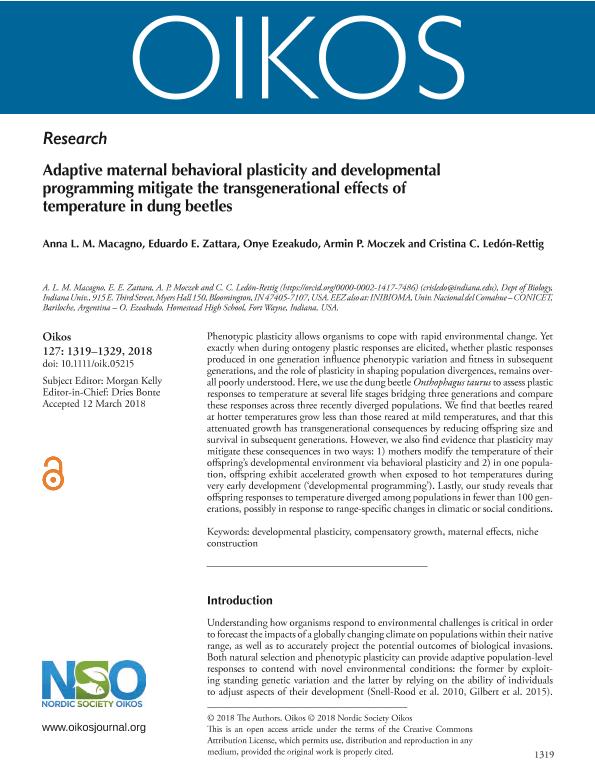Mostrar el registro sencillo del ítem
dc.contributor.author
Macagno, Anna L. M.
dc.contributor.author
Zattara, Eduardo Enrique

dc.contributor.author
Ezeakudo, Onye
dc.contributor.author
Moczek, Armin P.
dc.contributor.author
Ledón Rettig, Cristina

dc.date.available
2020-01-02T22:47:55Z
dc.date.issued
2018-09-14
dc.identifier.citation
Macagno, Anna L. M.; Zattara, Eduardo Enrique; Ezeakudo, Onye; Moczek, Armin P.; Ledón Rettig, Cristina; Adaptive maternal behavioral plasticity and developmental programming mitigate the transgenerational effects of temperature in dung beetles; Wiley Blackwell Publishing, Inc; Oikos; 127; 9; 14-9-2018; 1319-1329
dc.identifier.issn
0030-1299
dc.identifier.uri
http://hdl.handle.net/11336/93338
dc.description.abstract
Phenotypic plasticity allows organisms to cope with rapid environmental change. Yet exactly when during ontogeny plastic responses are elicited, whether plastic responses produced in one generation influence phenotypic variation and fitness in subsequent generations, and the role of plasticity in shaping population divergences, remains overall poorly understood. Here, we use the dung beetle Onthophagus taurus to assess plastic responses to temperature at several life stages bridging three generations and compare these responses across three recently diverged populations. We find that beetles reared at hotter temperatures grow less than those reared at mild temperatures, and that this attenuated growth has transgenerational consequences by reducing offspring size and survival in subsequent generations. However, we also find evidence that plasticity may mitigate these consequences in two ways: 1) mothers modify the temperature of their offspring's developmental environment via behavioral plasticity and 2) in one population, offspring exhibit accelerated growth when exposed to hot temperatures during very early development (‘developmental programming’). Lastly, our study reveals that offspring responses to temperature diverged among populations in fewer than 100 generations, possibly in response to range-specific changes in climatic or social conditions.
dc.format
application/pdf
dc.language.iso
eng
dc.publisher
Wiley Blackwell Publishing, Inc

dc.rights
info:eu-repo/semantics/openAccess
dc.rights.uri
https://creativecommons.org/licenses/by/2.5/ar/
dc.subject
COMPENSATORY GROWTH
dc.subject
DEVELOPMENTAL PLASTICITY
dc.subject
MATERNAL EFFECTS
dc.subject
NICHE CONSTRUCTION
dc.subject.classification
Ecología

dc.subject.classification
Ciencias Biológicas

dc.subject.classification
CIENCIAS NATURALES Y EXACTAS

dc.title
Adaptive maternal behavioral plasticity and developmental programming mitigate the transgenerational effects of temperature in dung beetles
dc.type
info:eu-repo/semantics/article
dc.type
info:ar-repo/semantics/artículo
dc.type
info:eu-repo/semantics/publishedVersion
dc.date.updated
2019-10-10T13:47:11Z
dc.journal.volume
127
dc.journal.number
9
dc.journal.pagination
1319-1329
dc.journal.pais
Reino Unido

dc.journal.ciudad
Londres
dc.description.fil
Fil: Macagno, Anna L. M.. Indiana University; Estados Unidos
dc.description.fil
Fil: Zattara, Eduardo Enrique. Consejo Nacional de Investigaciones Científicas y Técnicas. Centro Científico Tecnológico Conicet - Patagonia Norte. Instituto de Investigaciones en Biodiversidad y Medioambiente. Universidad Nacional del Comahue. Centro Regional Universidad Bariloche. Instituto de Investigaciones en Biodiversidad y Medioambiente; Argentina. Indiana University; Estados Unidos
dc.description.fil
Fil: Ezeakudo, Onye. Homestead High School; Estados Unidos
dc.description.fil
Fil: Moczek, Armin P.. Indiana University; Estados Unidos
dc.description.fil
Fil: Ledón Rettig, Cristina. Indiana University; Estados Unidos
dc.journal.title
Oikos

dc.relation.alternativeid
info:eu-repo/semantics/altIdentifier/url/https://onlinelibrary.wiley.com/doi/full/10.1111/oik.05215
dc.relation.alternativeid
info:eu-repo/semantics/altIdentifier/doi/http://dx.doi.org/10.1111/oik.05215
Archivos asociados
